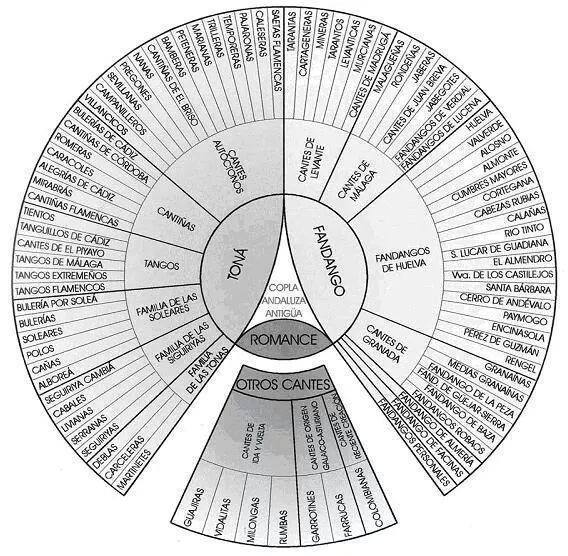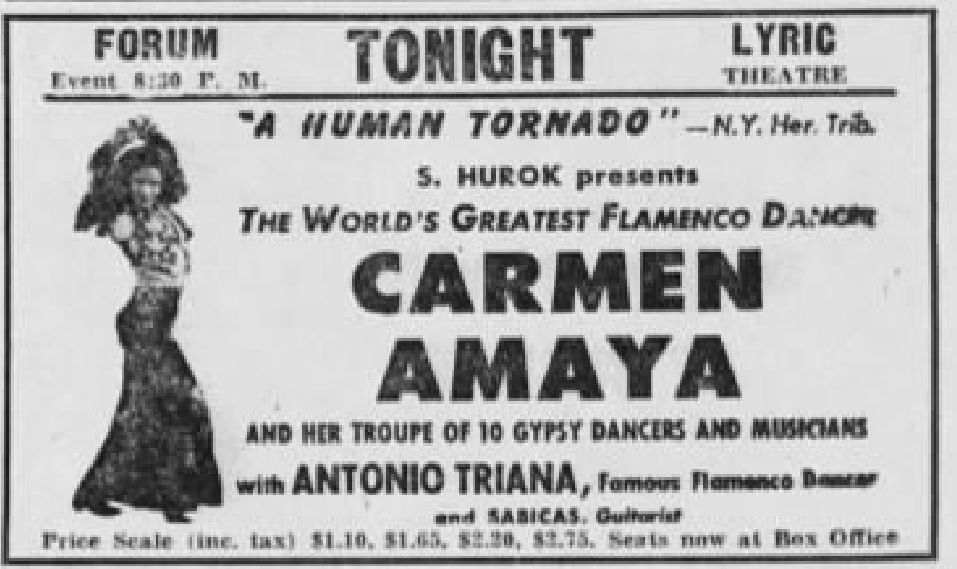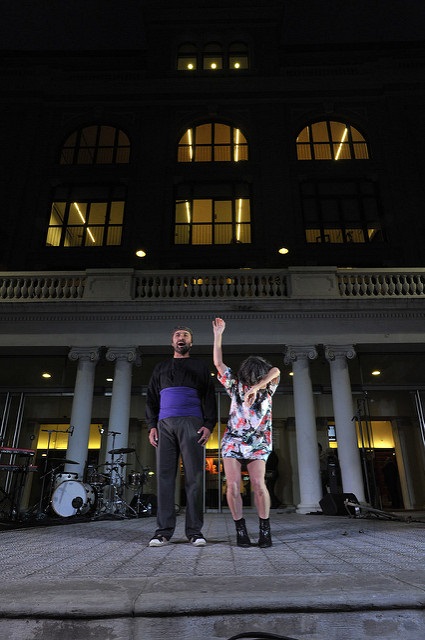|
Garrotín
Garrotín is a style of improvised song, featuring (palo) flamenco singing, dancing, and guitar playing, which developed near the end of the nineteenth century in Asturias, in northern Spain. It is played or sung in a Major mode, and a simple 2/4 meter, and has a cheerful and festive character. After being introduced into the flamenco repertoire, ''garrotín'' was further developed by singer Pastora Pavón ("Niña de los Peines"), and has been recently popularized by dancer, Carmen Amaya Carmen Amaya Amaya (2 November 1918 – 19 November 1963), nicknamed ''La Capitana'' (English: ''The Captain'') was a Spanish Romani flamenco dancer and singer, born in the Somorrostro district of Barcelona, Catalonia, Spain. She is often ha .... Style Garrotín is sung in 2/4 metres, normally with 8 syllables per line. It consists of a fixed chorus with a rhythmic melody, and the stanzas are improvised as they are sung. The content of the stanzas is usually burlesque or ironic, with the ... [...More Info...] [...Related Items...] OR: [Wikipedia] [Google] [Baidu] |
Palo (flamenco)
A ''palo'' () or cante is the name given in flamenco for the different traditional musical forms. The word ''palo'', in Spanish, has several meanings, the main one being "stick", "pole", "rod", "tree" or "branch", but in this case it has the sense of "Playing card, suit of cards" i.e. Categorization, category or classification. Identifying palos Each ''palo'' is identified by a variety of musical features such as its Rhythm, rhythmic pattern, its Musical mode, mode, its characteristic Motif (music), motifs, the type of stanza used for the lyrics, and its origin. The concept of ''palo'' is not straightforward or rigorous. It is a popular, sometimes inconsistent way of classifying songs according to similar characteristics. For example, to determine that a song belongs to the ''palo'' called Bulerías, only the rhythm is taken into consideration, no matter its mode or stanza. Fandangos, on the other hand, include a variety of forms in or , but later it developed "free" forms (t ... [...More Info...] [...Related Items...] OR: [Wikipedia] [Google] [Baidu] |
Flamenco
Flamenco () is an art form based on the various folkloric music traditions of southern Spain, developed within the Gitanos, gitano subculture of the region of Andalusia, and also having historical presence in Extremadura and Region of Murcia, Murcia. In a wider sense, the term is used to refer to a variety of both contemporary and traditional musical styles typical of southern Spain. Flamenco is closely associated to the gitanos of the Romani people, Romani ethnicity who have contributed significantly to its origination and professionalization. However, its style is uniquely Andalusian and flamenco artists have historically included Spaniards of both gitano and non-gitano heritage. The oldest record of flamenco music dates to 1774 in the book ''Las Cartas Marruecas'' (The Moroccan Letters) by José Cadalso. The development of flamenco over the past two centuries is well documented: "the theatre movement of sainetes (one-act plays) and tonadillas, popular song books and song s ... [...More Info...] [...Related Items...] OR: [Wikipedia] [Google] [Baidu] |
Pastora Pavón
Pastora were a Spanish/ Catalan electronic group from Barcelona, consisting of Dolo Beltrán (vocals), Caïm Riba Pastor (guitar, synthesisers and programming), and Pauet Riba Pastor (programming and visuals.) Origins After studying visual and digital arts and multimedia, the brothers Pauet and Caïm Riba Pastor formed the group as an audio-visual project in 1996. As a duo, they released the experimental electronic albums "Trip show audio visual tecno simfonic" (1998) and "Cosmossoma" (2000) with the latter featuring their father Pau Riba, a famous Catalan rock artist from the 1970s. However, neither album achieved commercial success. In 2000, to strengthen the project, they added former professional actress Dolo Beltran as vocalist and songwriter and abandoned the experimental efforts in search of a more accessible sound. Breakthrough The group achieved their breakthrough in 2004 with the track "Lola" reaching the Spanish top ten. The eponymous parent album "Pastora" achieved ... [...More Info...] [...Related Items...] OR: [Wikipedia] [Google] [Baidu] |
Carmen Amaya
Carmen Amaya Amaya (2 November 1918 – 19 November 1963), nicknamed ''La Capitana'' (English: ''The Captain'') was a Spanish Romani flamenco dancer and singer, born in the Somorrostro district of Barcelona, Catalonia, Spain. She is often hailed as "the greatest Flamenco dancer ever"Clarke, Mary & Crisp, Clement 1981. ''The history of dance''. Orbis, London. p60 and "the most extraordinary personality of all time in flamenco dance."Clarke, Mary & Vaughan, David 1977. ''The encyclopedia of dance & ballet.'' Pitman, London. p316 She was the first female flamenco dancer to master footwork previously reserved for the best male dancers, due to its speed and intensity. She sometimes danced in high-waisted trousers as a symbol of her strong character. Biography Carmen Amaya Amaya was born in Somorrostro, Spain, to a Romani family, her father José Amaya Amaya (''alias'' "El Chino", "The Chinaman"), a guitar player, and Micaela Amaya Moreno, her mother. Carmen was the second of ele ... [...More Info...] [...Related Items...] OR: [Wikipedia] [Google] [Baidu] |
Fira Mediterrania In Manresa
Fira Mediterrània of Manresa (Catalonia-Spain) is a performing arts fair rooted in Mediterranean tradition. It has two main areas of focus: popular culture (based on a dialogue between traditional, regional culture and creative innovation) and world music. It has been held every year since 1998 and has become a setting for exchange professionals that sell and buy productions. Most activities are open to the public at large and the Fira uses a range of stage areas in the city centre. Despite this, activities exclusively aimed at industry professionals are a cornerstone of the Fira. These include industry conferences, a recruitment place, partnership network meetings and presentations. Together with FiràTarrega (the international market for performing arts), Mercat de Música Viva de Vic (Vic live music market), the Sismòfraf d'Olot, the Mostra d'Igualada and the Fira Trapezi, the Fira Mediterrània completes the Generalitat (Regional Government) of Catalonia's map of artistic ... [...More Info...] [...Related Items...] OR: [Wikipedia] [Google] [Baidu] |
Flamenco Styles
Flamenco () is an art form based on the various folkloric music traditions of southern Spain, developed within the gitano subculture of the region of Andalusia, and also having historical presence in Extremadura and Murcia. In a wider sense, the term is used to refer to a variety of both contemporary and traditional musical styles typical of southern Spain. Flamenco is closely associated to the gitanos of the Romani ethnicity who have contributed significantly to its origination and professionalization. However, its style is uniquely Andalusian and flamenco artists have historically included Spaniards of both gitano and non-gitano heritage. The oldest record of flamenco music dates to 1774 in the book ''Las Cartas Marruecas'' (The Moroccan Letters) by José Cadalso. The development of flamenco over the past two centuries is well documented: "the theatre movement of sainetes (one-act plays) and tonadillas, popular song books and song sheets, customs, studies of dances, an ... [...More Info...] [...Related Items...] OR: [Wikipedia] [Google] [Baidu] |
Spanish Dances
Spanish might refer to: * Items from or related to Spain: **Spaniards are a nation and ethnic group indigenous to Spain **Spanish language, spoken in Spain and many countries in the Americas **Spanish cuisine ** Spanish history **Spanish culture **Languages of Spain, the various languages in Spain Other places * Spanish, Ontario, Canada * Spanish River (other), the name of several rivers * Spanish Town, Jamaica Other uses * John J. Spanish (1922–2019), American politician * "Spanish" (song), a single by Craig David, 2003 See also * * * Español (other) * Spain (other) * España (other) * Espanola (other) * Hispania, the Roman and Greek name for the Iberian Peninsula * Hispanic, the people, nations, and cultures that have a historical link to Spain * Hispanic (other) * Hispanism * Spain (other) * National and regional identity in Spain * Culture of Spain The culture of Spain is influenced by its Western ... [...More Info...] [...Related Items...] OR: [Wikipedia] [Google] [Baidu] |



